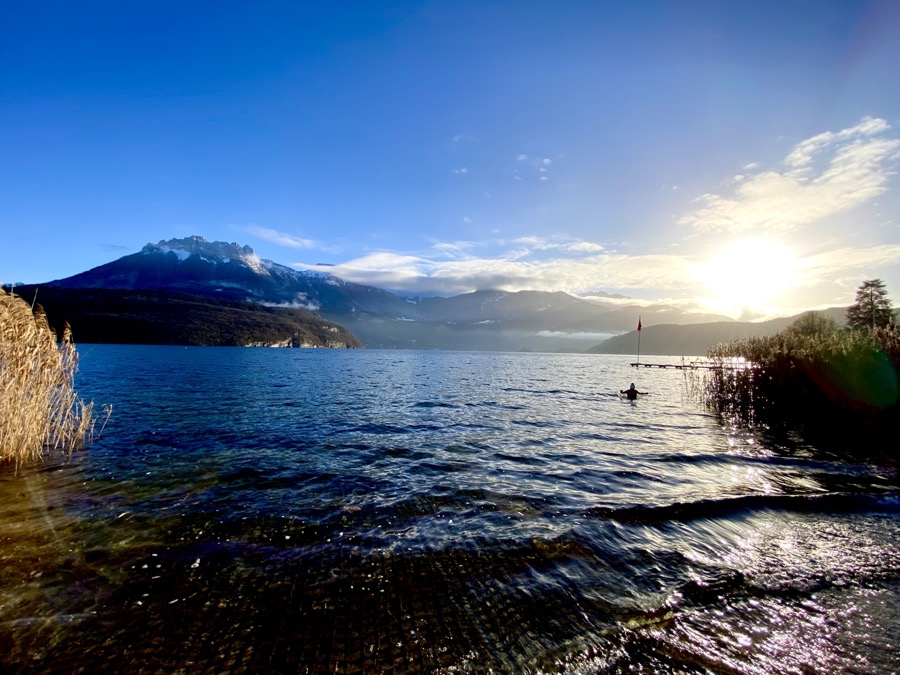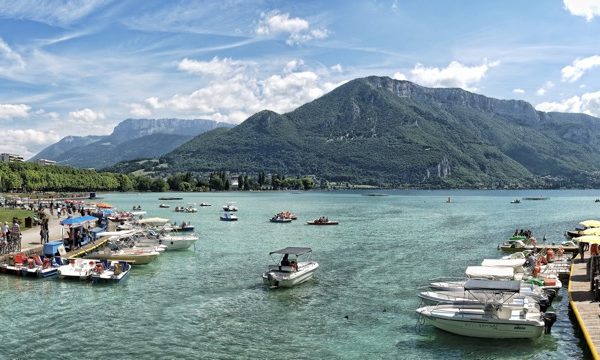A decade ago, I co-founded a cold water swimming club with my local American bestie, Liz. It wasn’t a master plan focused on personal challenge or dreams of next-level wellbeing. We were just two swimmers who loved a good dip in our precious Lake Annecy in the late spring and summer months. Why not extend our season we thought? In the beginning, we were clever enough to seek out the help of seasoned experts. Thankfully, the Vikings, a cold water swimming club across the lake, took us under their wing. They explained the many ins and outs of the sport and managing a club.
Despite help from the Vikings, we made so many mistakes in those early years. But as we were just a handful of members, it was fun dipping our toes into the sport at our own pace. We never imagined that a decade later the practice would become a “thing” and our club would grow to the point of requiring a waiting list!
The benefits of cold water swimming are numerous and well-known today. They include better circulation, boosting the immune system, improved cardiovascular health, and of course an endorphin-fuelled high that lasts throughout the day (the reason we all become “addicted”!).
On a more personal level though, here are the 10 most important lessons I’ve learned from my decade of cold water swimming.
Personal Identity
To be clear, I hate cold water. I am a seriously hot, hot water shower devotee. Even after a decade of winter swimming, getting into cold water is not easy. In the early days when we tried to recruit members to our club, the typical response was, “I find the lake cold in the summer already, I couldn’t swim in the winter!” Newbies think some type of self-qualified character trait is needed to join. As though cold water swimmers were actually polar bears in disguise. Nope. Just grab a bathing suit and literally, dip your toes in cold water and bam! You’re a cold water swimmer! I’ve learned self-perception is an odd being that can talk us out of trying something new …. and a possible future passion.
Comfort Zone
We all know that the greatest moments in life are created outside our comfort zone. Cold water swimming reinforces this concept to me weekly. As I walk down to the lake on a blistery, winter day, I sometimes feel there is zero chance I’m going to actually swim. There is often a split second when I ponder staying home and sipping on deliciously warm soup. Almost every time though, I walk out the door and go for it. But it takes practice… and ten years of practice has helped me get out of my comfort zone in other parts of my life.
Mental exercise
Cold water swimming is, for all intents and purposes, a total mind game. It requires zero physical skill (not even swimming). Except for those with certain health issues (see below), the average, healthy adult human body is equipped to handle cold water for a limited amount of time if practiced in the right circumstances.
Learning how to cope with temporary discomfort is the beauty of this sport. It requires calming the mind (thus calming the body), pushing negative thoughts to the back of the mind, relaxing in the midst of physical discomfort, revelling in delayed gratification, and trusting your body to cope with the sudden shock of freezing water. Unlike many other sports, cold water swimming is never about going further or staying in longer, past a certain point. It requires really knowing when enough is enough and parking our ego telling us that “more is better”. It’s a good dose of mental gymnastics that serves us well in and out of the water.
Mind games
Early on in my winter swimming practice, I tried different coping mechanisms for dealing with cold water. The hardest moment for me is taking the first stroke and immersing myself completely. It’s such a shock! My tried and tested method is to count down from 10 and promise myself that I will be in the water by number one. It works every time. And then once immersed, I count back up to ten to allow my body to process the cold. By this point, I usually feel more relaxed. Mind games and tricks go a long way to overcoming difficulty and producing results.
Natural beauty
It’s no secret that being in nature plays a huge part in a healthy lifestyle. Being outdoors reduces stress, increases mental wellbeing, lowers blood pressure, relieves anxiety and so much more. Couple these amazing benefits with those of cold water swimming, and it’s a win-win formula.
Concept of wellbeing
Before I began cold water swimming, I thought any activity that didn’t require sweating, pounding the pavement or feeling completely worn out were not worth my time. The concept of doing something good for my body, as opposed to wearing it out in the name of “fitness”, was completely foreign to me. A decade of winter swimming, and a decade point-blank (the wisdom of age!) have helped me realize that when the body is treated well, it will serve you well. My wellbeing focus has most definitely shifted from short-term to long-term.
Know your limits
Although getting out of one’s comfort zone is a key benefit of cold water swimming, the flip side of the coin requires listening acutely to one’s body while in the water. At this point in the game, I pretty much know when I can hold out another minute in the cold water or when I need to get out. Staying in cold water for too long can be dangerous, and at best, it is unpleasant to be so “bone cold” (I now know where the expression comes from) for the rest of the day that no amount of warm drinks or hot showers will alleviate the feeling.
And like any other sport, we have good days and bad days that vary – with the weather, our state of mind, our energy or lack of it. In a sport that is almost always done with others, it is essential to pay attention to one’s body and not necessarily follow those who feel okay staying in the water longer.
Age is not just a number
Am I the only person who hates the saying, “Age is just a number”. No it’s not. Age is age. A 50-year-old is not the same as a 30-year-old, no matter how “young” and energetic the 50-year-old feels. But ageing well is most certainly a state of mind as much as it is physical. The older members of our group (our club ranges from 18-80+) are the youngest, most free-spirited “older” people I know. They love the feel-good vibes produced by cold water, they think nothing of getting out of their comfort zone, and they definitely know their limits (which are usually superior to the younger members, go figure). I’m inspired by the other members, and it makes me look forward to continuing this practice for years to come.
To each their style
Aside from being cautious about safety, there is no right or wrong way to swim in cold water. Unlike sports that require top notch technique to rise through the ranks (tennis, golf, swimming), cold water swimming is, literally, a dip in a cold ocean (or lake, or pool). For those that want to swim, no problem. For those that can’t or don’t want to, just get in and stay in for a moment. The benefits are similar. And to each their style: backstroke, bobbing up and down, breast stroke with your head in or out the water. Whatever works, go for it! Personally I like to end each swim by dipping my face into the water for ten seconds or so. Apparently cold water facials are a thing!
Safety is always first
In the decade our winter swimming club has existed we have not had any emergencies (I’m knocking on wood as I type). We take safety seriously and have relied upon professionals in different areas to train us and be on call if needed. Aside from a heart check with the general doctor, safety precautions should include the following:
- Always swim with others and stay relatively close to each other during the swim.
- Have at least one flotation device amongst the group.
- It’s best to acclimatise and keep swimming from the summer through to the winter. Your body will get used to the progressive cold.
- Skip the diving. It’s a complete shock to the body and doesn’t bring benefits that swimming can’t provide.
- Wear a swimming cap or woolly hat to better preserve body heat.
- If possible, stay in relatively shallow water. If someone needs to be pulled out of the water quickly, this makes it much easier.
- A few minutes in the midst of winter is enough! Typically at 10 Celsius and below only one minute of swimming per degree is advised. So at 9 degrees Celsius, 9 minutes maximum.
- The most important safety precaution is to listen to your body. It’s better to get out a minute too soon than to get into trouble from staying in too long.
To contact me with comments or questions, please find me on LinkedIn or via my contact form. Visit me on Pinterest too!













